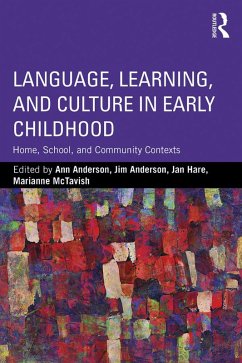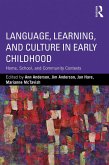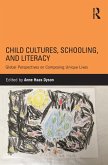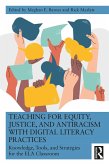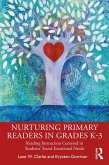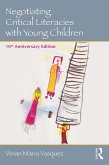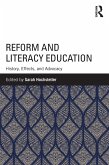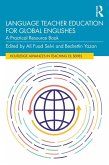Language, Learning, and Culture in Early Childhood (eBook, ePUB)
Home, School, and Community Contexts
Redaktion: Anderson, Ann; McTavish, Marianne; Hare, Jan; Anderson, Jim
49,95 €
49,95 €
inkl. MwSt.
Sofort per Download lieferbar

25 °P sammeln
49,95 €
Als Download kaufen

49,95 €
inkl. MwSt.
Sofort per Download lieferbar

25 °P sammeln
Jetzt verschenken
Alle Infos zum eBook verschenken
49,95 €
inkl. MwSt.
Sofort per Download lieferbar
Alle Infos zum eBook verschenken

25 °P sammeln
Language, Learning, and Culture in Early Childhood (eBook, ePUB)
Home, School, and Community Contexts
Redaktion: Anderson, Ann; McTavish, Marianne; Hare, Jan; Anderson, Jim
- Format: ePub
- Merkliste
- Auf die Merkliste
- Bewerten Bewerten
- Teilen
- Produkt teilen
- Produkterinnerung
- Produkterinnerung

Bitte loggen Sie sich zunächst in Ihr Kundenkonto ein oder registrieren Sie sich bei
bücher.de, um das eBook-Abo tolino select nutzen zu können.
Hier können Sie sich einloggen
Hier können Sie sich einloggen
Sie sind bereits eingeloggt. Klicken Sie auf 2. tolino select Abo, um fortzufahren.

Bitte loggen Sie sich zunächst in Ihr Kundenkonto ein oder registrieren Sie sich bei bücher.de, um das eBook-Abo tolino select nutzen zu können.
Complex factors affect young children and their families as communities continue to become more diverse around the globe. This book focuses on three of these factors-culture, language and learning-and how they affect children's development and learning in the context of their communities, families and schools.
- Geräte: eReader
- mit Kopierschutz
- eBook Hilfe
- Größe: 2.33MB
Andere Kunden interessierten sich auch für
![Language, Learning, and Culture in Early Childhood (eBook, PDF) Language, Learning, and Culture in Early Childhood (eBook, PDF)]() Language, Learning, and Culture in Early Childhood (eBook, PDF)48,95 €
Language, Learning, and Culture in Early Childhood (eBook, PDF)48,95 €![Child Cultures, Schooling, and Literacy (eBook, ePUB) Child Cultures, Schooling, and Literacy (eBook, ePUB)]() Child Cultures, Schooling, and Literacy (eBook, ePUB)51,95 €
Child Cultures, Schooling, and Literacy (eBook, ePUB)51,95 €![Teaching for Equity, Justice, and Antiracism with Digital Literacy Practices (eBook, ePUB) Teaching for Equity, Justice, and Antiracism with Digital Literacy Practices (eBook, ePUB)]() Teaching for Equity, Justice, and Antiracism with Digital Literacy Practices (eBook, ePUB)43,95 €
Teaching for Equity, Justice, and Antiracism with Digital Literacy Practices (eBook, ePUB)43,95 €![Nurturing Primary Readers in Grades K-3 (eBook, ePUB) Nurturing Primary Readers in Grades K-3 (eBook, ePUB)]() Lane W. ClarkeNurturing Primary Readers in Grades K-3 (eBook, ePUB)41,95 €
Lane W. ClarkeNurturing Primary Readers in Grades K-3 (eBook, ePUB)41,95 €![Negotiating Critical Literacies with Young Children (eBook, ePUB) Negotiating Critical Literacies with Young Children (eBook, ePUB)]() Vivian Maria VasquezNegotiating Critical Literacies with Young Children (eBook, ePUB)41,95 €
Vivian Maria VasquezNegotiating Critical Literacies with Young Children (eBook, ePUB)41,95 €![Reform and Literacy Education (eBook, ePUB) Reform and Literacy Education (eBook, ePUB)]() Reform and Literacy Education (eBook, ePUB)41,95 €
Reform and Literacy Education (eBook, ePUB)41,95 €![Language Teacher Education for Global Englishes (eBook, ePUB) Language Teacher Education for Global Englishes (eBook, ePUB)]() Language Teacher Education for Global Englishes (eBook, ePUB)38,95 €
Language Teacher Education for Global Englishes (eBook, ePUB)38,95 €-
-
-
Complex factors affect young children and their families as communities continue to become more diverse around the globe. This book focuses on three of these factors-culture, language and learning-and how they affect children's development and learning in the context of their communities, families and schools.
Dieser Download kann aus rechtlichen Gründen nur mit Rechnungsadresse in A, B, BG, CY, CZ, D, DK, EW, E, FIN, F, GR, HR, H, IRL, I, LT, L, LR, M, NL, PL, P, R, S, SLO, SK ausgeliefert werden.
Produktdetails
- Produktdetails
- Verlag: Taylor & Francis eBooks
- Seitenzahl: 308
- Erscheinungstermin: 7. Dezember 2015
- Englisch
- ISBN-13: 9781317416203
- Artikelnr.: 44472721
- Verlag: Taylor & Francis eBooks
- Seitenzahl: 308
- Erscheinungstermin: 7. Dezember 2015
- Englisch
- ISBN-13: 9781317416203
- Artikelnr.: 44472721
- Herstellerkennzeichnung Die Herstellerinformationen sind derzeit nicht verfügbar.
Ann Anderson is Professor, Curriculum and Pedagogy, University of British Columbia, Canada. Jim Anderson is Professor, Language and Literacy Education, University of British Columbia, Canada. Marianne McTavish is Senior Instructor, Language and Literacy Education, University of British Columbia, Canada. Jan Hare is Associate Professor, Language and Literacy Education, University of British Columbia, Canada.
Contents
Foreword
Allan Luke
Preface
Acknowledgements
Chapter 1: Language, learning and culture in early childhood: Home, school
and community contexts-An IntroductionAnn Anderson, Jim Anderson, Jan Hare,
Marianne McTavish & Tess Prendergast
Chapter 2: Young children's emerging identities as bilingual and biliterate
students: The role of context
Eurydice Bouchereau Bauer & Beatriz Guerrero
Chapter 3: Halq'eméylem language revitalization
Margaret MacDonald & Danièle Moore
Chapter 4: Speaking English isn't thinking English: Exploring young
Aboriginal children's mathematical experiences through Aboriginal
perspectives
Lisa Lunney Borden & Elizabeth Munroe
Chapter 5: "Now he knows that there are two kinds of writing, two kinds of
reading": Insights and issues in working with immigrant and refugee
families and communities in a bilingual family literacy program
Jim Anderson, Nicola Friedrich, Laura Teichert & Fiona Morrison
Chapter 6: Social class, culture, and Asian children's home and school
literacy connection: The Case for cultural reciprocity in early literacy
education
Guofang Li
Chapter 7: Considering place for connecting mathematics, community and
culture
Cynthia Nicol, Joanne Yovanovich & Alison Gear
Chapter 8: Culture and mathematical learning: A case study of South-Asian
parents and children playing a board game
Ann Anderson, Ji Eun Kim, and Sylvia McLellan
Chapter 9: Reconceptualizing "parent and child together time" in family
literacy programs: Lessons learned from refugee and immigrant families
Marianne McTavish and Kimberly Lenters
Chapter 10: What is involved in modeling the world with mathematics
Terezinha Nunes
Chapter 11: Indigenous pedagogies in early learning settings: Linking
community knowledge to school-based learning
Jan Hare
Chapter 12: Sailing the ship while we study it: Culturally responsive
research strategies in early childhood contexts
Amy Noelle Parks
Chapter 13: A critical analysis of culturally and linguistically diverse
community participation in Canadian early childhood education: Power
relations, tensions and possibilities
Luigi Iannacci
Chapter 14: Looking back, looking ahead: Reflections on the intersection of
language, culture, and learning in early childhood
Nicola Friedrich, Ji Eun Kim, Sylvia McLellan, Tess Prendergast, Harini
Rajagopal, & Laura Teichert,
Foreword
Allan Luke
Preface
Acknowledgements
Chapter 1: Language, learning and culture in early childhood: Home, school
and community contexts-An IntroductionAnn Anderson, Jim Anderson, Jan Hare,
Marianne McTavish & Tess Prendergast
Chapter 2: Young children's emerging identities as bilingual and biliterate
students: The role of context
Eurydice Bouchereau Bauer & Beatriz Guerrero
Chapter 3: Halq'eméylem language revitalization
Margaret MacDonald & Danièle Moore
Chapter 4: Speaking English isn't thinking English: Exploring young
Aboriginal children's mathematical experiences through Aboriginal
perspectives
Lisa Lunney Borden & Elizabeth Munroe
Chapter 5: "Now he knows that there are two kinds of writing, two kinds of
reading": Insights and issues in working with immigrant and refugee
families and communities in a bilingual family literacy program
Jim Anderson, Nicola Friedrich, Laura Teichert & Fiona Morrison
Chapter 6: Social class, culture, and Asian children's home and school
literacy connection: The Case for cultural reciprocity in early literacy
education
Guofang Li
Chapter 7: Considering place for connecting mathematics, community and
culture
Cynthia Nicol, Joanne Yovanovich & Alison Gear
Chapter 8: Culture and mathematical learning: A case study of South-Asian
parents and children playing a board game
Ann Anderson, Ji Eun Kim, and Sylvia McLellan
Chapter 9: Reconceptualizing "parent and child together time" in family
literacy programs: Lessons learned from refugee and immigrant families
Marianne McTavish and Kimberly Lenters
Chapter 10: What is involved in modeling the world with mathematics
Terezinha Nunes
Chapter 11: Indigenous pedagogies in early learning settings: Linking
community knowledge to school-based learning
Jan Hare
Chapter 12: Sailing the ship while we study it: Culturally responsive
research strategies in early childhood contexts
Amy Noelle Parks
Chapter 13: A critical analysis of culturally and linguistically diverse
community participation in Canadian early childhood education: Power
relations, tensions and possibilities
Luigi Iannacci
Chapter 14: Looking back, looking ahead: Reflections on the intersection of
language, culture, and learning in early childhood
Nicola Friedrich, Ji Eun Kim, Sylvia McLellan, Tess Prendergast, Harini
Rajagopal, & Laura Teichert,
Contents
Foreword
Allan Luke
Preface
Acknowledgements
Chapter 1: Language, learning and culture in early childhood: Home, school
and community contexts-An IntroductionAnn Anderson, Jim Anderson, Jan Hare,
Marianne McTavish & Tess Prendergast
Chapter 2: Young children's emerging identities as bilingual and biliterate
students: The role of context
Eurydice Bouchereau Bauer & Beatriz Guerrero
Chapter 3: Halq'eméylem language revitalization
Margaret MacDonald & Danièle Moore
Chapter 4: Speaking English isn't thinking English: Exploring young
Aboriginal children's mathematical experiences through Aboriginal
perspectives
Lisa Lunney Borden & Elizabeth Munroe
Chapter 5: "Now he knows that there are two kinds of writing, two kinds of
reading": Insights and issues in working with immigrant and refugee
families and communities in a bilingual family literacy program
Jim Anderson, Nicola Friedrich, Laura Teichert & Fiona Morrison
Chapter 6: Social class, culture, and Asian children's home and school
literacy connection: The Case for cultural reciprocity in early literacy
education
Guofang Li
Chapter 7: Considering place for connecting mathematics, community and
culture
Cynthia Nicol, Joanne Yovanovich & Alison Gear
Chapter 8: Culture and mathematical learning: A case study of South-Asian
parents and children playing a board game
Ann Anderson, Ji Eun Kim, and Sylvia McLellan
Chapter 9: Reconceptualizing "parent and child together time" in family
literacy programs: Lessons learned from refugee and immigrant families
Marianne McTavish and Kimberly Lenters
Chapter 10: What is involved in modeling the world with mathematics
Terezinha Nunes
Chapter 11: Indigenous pedagogies in early learning settings: Linking
community knowledge to school-based learning
Jan Hare
Chapter 12: Sailing the ship while we study it: Culturally responsive
research strategies in early childhood contexts
Amy Noelle Parks
Chapter 13: A critical analysis of culturally and linguistically diverse
community participation in Canadian early childhood education: Power
relations, tensions and possibilities
Luigi Iannacci
Chapter 14: Looking back, looking ahead: Reflections on the intersection of
language, culture, and learning in early childhood
Nicola Friedrich, Ji Eun Kim, Sylvia McLellan, Tess Prendergast, Harini
Rajagopal, & Laura Teichert,
Foreword
Allan Luke
Preface
Acknowledgements
Chapter 1: Language, learning and culture in early childhood: Home, school
and community contexts-An IntroductionAnn Anderson, Jim Anderson, Jan Hare,
Marianne McTavish & Tess Prendergast
Chapter 2: Young children's emerging identities as bilingual and biliterate
students: The role of context
Eurydice Bouchereau Bauer & Beatriz Guerrero
Chapter 3: Halq'eméylem language revitalization
Margaret MacDonald & Danièle Moore
Chapter 4: Speaking English isn't thinking English: Exploring young
Aboriginal children's mathematical experiences through Aboriginal
perspectives
Lisa Lunney Borden & Elizabeth Munroe
Chapter 5: "Now he knows that there are two kinds of writing, two kinds of
reading": Insights and issues in working with immigrant and refugee
families and communities in a bilingual family literacy program
Jim Anderson, Nicola Friedrich, Laura Teichert & Fiona Morrison
Chapter 6: Social class, culture, and Asian children's home and school
literacy connection: The Case for cultural reciprocity in early literacy
education
Guofang Li
Chapter 7: Considering place for connecting mathematics, community and
culture
Cynthia Nicol, Joanne Yovanovich & Alison Gear
Chapter 8: Culture and mathematical learning: A case study of South-Asian
parents and children playing a board game
Ann Anderson, Ji Eun Kim, and Sylvia McLellan
Chapter 9: Reconceptualizing "parent and child together time" in family
literacy programs: Lessons learned from refugee and immigrant families
Marianne McTavish and Kimberly Lenters
Chapter 10: What is involved in modeling the world with mathematics
Terezinha Nunes
Chapter 11: Indigenous pedagogies in early learning settings: Linking
community knowledge to school-based learning
Jan Hare
Chapter 12: Sailing the ship while we study it: Culturally responsive
research strategies in early childhood contexts
Amy Noelle Parks
Chapter 13: A critical analysis of culturally and linguistically diverse
community participation in Canadian early childhood education: Power
relations, tensions and possibilities
Luigi Iannacci
Chapter 14: Looking back, looking ahead: Reflections on the intersection of
language, culture, and learning in early childhood
Nicola Friedrich, Ji Eun Kim, Sylvia McLellan, Tess Prendergast, Harini
Rajagopal, & Laura Teichert,
